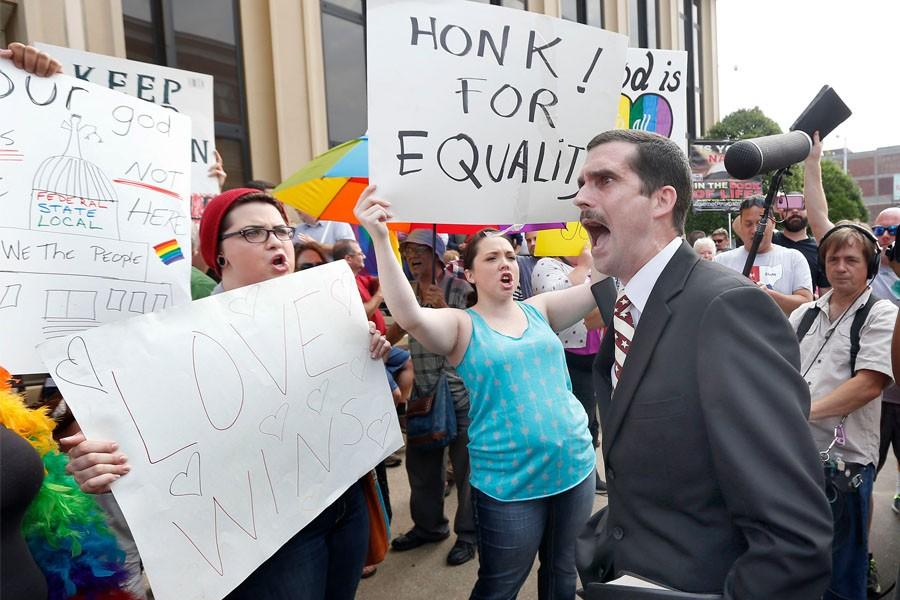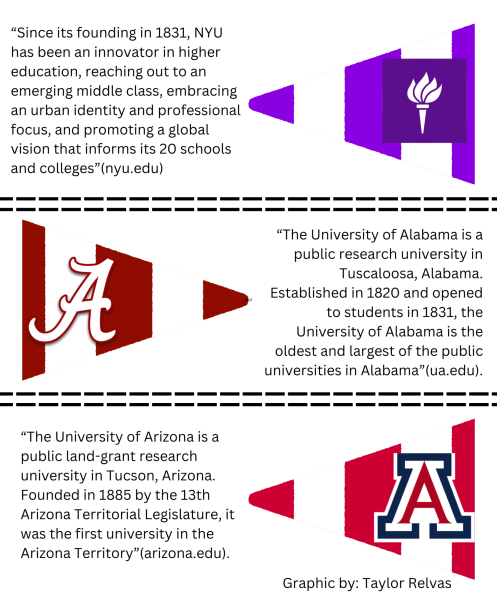Kentucky shows fight for equality not over yet
Street preacher Jeffrey Shook, with Unity Baptist Church in Hickory N.C., preaches to Kim Davis protestors in front of the Carl D. Perkins Federal Building in Ashland, Ky., on Thursday, Sept. 3, 2015. Davis was found guilty by U.S. District Judge David Bunning of contempt of court for refusing to issue marriage licenses in Rowan County, Ky.
September 4, 2015
On June 26, a mere two months ago, same-sex marriage finally made its formal debut as constitutional in the United States. Couples around the country seemed to rejoice endlessly, both heterosexual and homosexual, and the country’s capital was bathed in the bright colors of pride.
And yet, that moment has now passed, and America is now receiving the fighting, bitter aftertaste of opponents to the Supreme Court’s decision.
Where the deep south converges to meet the Midwest, the grand old state of Kentucky lies nestled in the heart of the homeland. As American as this may seem, Kentucky has struck up a hard argument, trying to fight the Supreme Court in issuing marriage licenses to same-sex couples.
Marriage hopefuls David Moore and David Ermold were denied a marriage license for their fifth time on Tuesday, September 1 by Kentucky county clerk Kim Davis. Citing her own beliefs as a reason not to issue the two a license, she called out God’s authority as her formal reason.
Supporters from both sides could be heard shouting “Do your job!” to “Praise the Lord!” to try and encourage either parties. Davis, being the ‘perfect Christian,’ stood her ground and refused to change her mind despite the raucous crowds around her.
Not to be one to discriminate, Davis stopped issuing marriage licenses altogether, ultimately causing more distress.
“To issue a marriage license which conflicts with God’s definition of marriage, with my name affixed to the certificate, would violate my conscience,” she said.
The overarching problem here does not end with a simple Kentucky clerk being discriminatory and bigoted, but the fact that she completely denies to do her job simply on the basis of her own personal beliefs. Not to mention the fact that she was also divorced three times, one may start to think she sounds a bit like a hypocrite.
A monumental Supreme Court decision was made just over two months ago, conquering years of fear and hate, and yet now a woman from a small county in Kentucky is the figurehead of complete disregard to a transformed country. Clerks all over the southern United States and a few from Texas have begun to follow Davis’ decision, which she started to do almost immediately after the ruling.
“It is not a light issue for me,” Davis stated, It is a Heaven or Hell decision.”
Previous couples denied by Davis were asked by attorneys if they would like to press charges against her, if they would like to see her doing jail time for denying them their right to be wed. Though appealing, every couple that was asked actually denied wanting her in jail.
“I don’t want to see anything but a marriage license,” marriage hopeful April Miller responded.
Fortunately, however, Davis was arrested in contempt on September 3, just two days after her decision to break federal law.
While in court, she stated that, “You can’t be separated from something that’s in your heart and soul,” referring to her devout Christian beliefs. Cheers of “Love won!” could be heard as she was taken away from the courthouse after only 20 minutes of testifying.
She will be held under US Marshall jurisdiction until she starts issuing licenses again, or until she tells her other clerks to do so, but no time limit has been stated to how long this may take.
While this particular case may be a happy ending, it only brings to light the struggle between personal beliefs and what is written law. Hopefully this does not appear as a pattern in our country, the country that was founded to move away from the oppression of freedom of religion, not the freedom to use religion to oppress.






